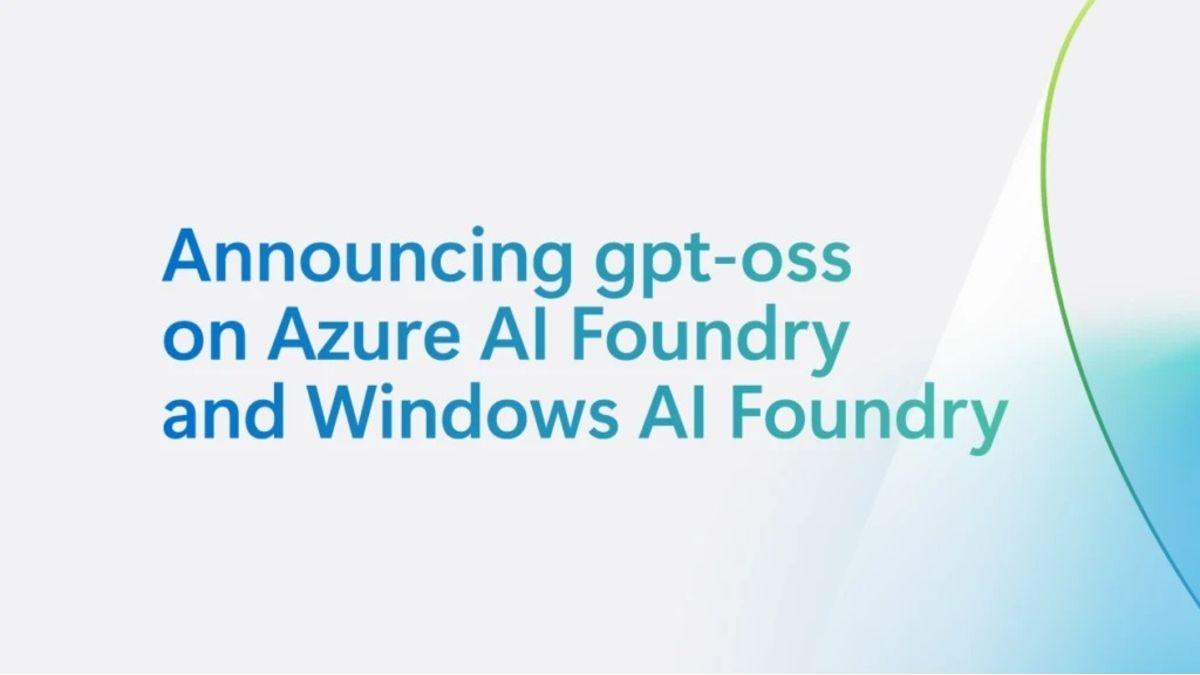Microsoft Integrates OpenAI's Open-Weight Model gpt-oss-20b into Windows 11
4 Sources
4 Sources
[1]
Microsoft brings OpenAI's smallest open model to Windows users | TechCrunch
Microsoft is making OpenAI's new free and open GPT model, gpt-oss-20b, available to Windows 11 users via Windows AI Foundry, the tech giant's platform that lets users tap AI features, APIs, and popular open-source models on their computers. The company said in a blog post that gpt‑oss-20b is "tool-savvy and lightweight," adding: "Optimized for agentic tasks like code execution and tool use, it runs efficiently on a range of Windows hardware, with support for more devices coming soon. It's perfect for building autonomous assistants or embedding AI into real-world workflows, even in bandwidth-constrained environments." Launched on Tuesday, OpenAI's gpt-oss-20b can run on consumer PCs and laptops with at least 16GB of VRAM, which a modern GPU from Nvidia or Radeon would have. OpenAI said the model was trained using high-compute reinforcement learning, which helps it excel at powering AI agents and call tools, such as web search or Python code execution, as part of its chain-of-thought process. However, the model is text-only, meaning it will not be able to process or generate images and audio like the company's other models. Also, the model has a habit of hallucinating a lot: gpt-oss-20b hallucinated in response to 53% of questions on PersonQA, OpenAI's in-house benchmark for measuring the accuracy of a model's knowledge about people. Microsoft says it will bring the model to macOS soon, as well as other devices, though the company did not name any more. Microsoft is also making both gpt-oss-20b and older model gpt-oss-120b available via its hosted Azure AI Foundry platform.
[2]
Microsoft makes OpenAI's new open model available on Windows
Microsoft has pre-optimized gpt-oss-20b for local inference, and it hints that support for more devices is coming soon. That could mean we see a more optimized version for Copilot Plus PCs at some point in the future, much like how Microsoft has been adding a variety of local AI models to Windows recently. Microsoft's speedy addition of OpenAI's latest model to the Windows AI Foundry comes as Amazon was equally quick to adopt the new open-weight GPT-OSS models for its cloud services. It's the first time you can run an OpenAI model locally on Windows, but it's also the first time Microsoft's biggest cloud competitor has had access to the latest OpenAI models -- adding another dynamic to the complicated OpenAI and Microsoft partnership.
[3]
OpenAI's gpt-oss models arrive on Azure AI Foundry
Microsoft is integrating OpenAI's open-weight language models, gpt-oss, into Azure AI Foundry and Windows AI Foundry, broadening its AI toolset. This expansion introduces gpt-oss-120b and gpt-oss-20b models to personal computers. The gpt-oss-120b model is designed for high-performance reasoning applications. Conversely, the gpt-oss-20b model operates on personal computers equipped with graphics processing units possessing a minimum of 16 gigabytes of memory. Developers are granted full access to the model weights, enabling fine-tuning for various applications, including offline functionality or specialized industry assistants. This open-weight access permits teams to review, retrain segments, or export these models for deployment on Microsoft's Azure Kubernetes Service (AKS) or local machines. Azure AI Foundry provides a suite of tools supporting model evaluation, fine-tuning, and deployment, featuring a catalog exceeding 11,000 models. Concurrently, Foundry Local extends on-device support, assisting users who require local inference capabilities for security considerations or offline accessibility. The gpt-oss-20b model from OpenAI is currently available on Windows, with macOS compatibility scheduled for a future release. Both models will maintain compatibility with the common responses API. Microsoft states this initiative aims to enhance flexibility, transparency, and operational choices for developers and businesses in their utilization and management of artificial intelligence across cloud, on-device, and edge environments.
[4]
Microsoft Brings OpenAI's Open-Weight AI Model to Windows 11
If you want to try it on other hardware, you can check out LM Studio or Ollama. OpenAI released two open-weight AI models: first, the larger gpt-oss-120b model, and second, the smaller gpt-oss-20b model. OpenAI says the smaller gpt-oss-20b AI model can run on edge devices such as laptops and smartphones with 16GB of VRAM. So, Microsoft, without wasting any time, has officially brought the smaller gpt-oss-20b model to Windows 11. As part of the Windows AI Foundry, OpenAI's gpt‑oss-20b model is now available via Foundry Local on Windows 11. Currently, only Nvidia GPUs are supported, which pack at least 16GB of VRAM. You need to install Foundry Local on your Windows 11 PC to access the gpt‑oss-20b model locally. You can simply run the below commands in the Terminal on your Windows 11 PC to start using OpenAI's open-weight model locally. Make sure you are running Foundry Local version 0.6.0 or above. This AI model has a total of 20 billion parameters and activates 3.6B parameters. While Microsoft's official method only lets you run OpenAI's open-weight model on Nvidia GPUs, there are plenty of other solutions that allow users to locally run such models. You can install LM Studio on your Windows 11 PC to start using the gpt‑oss-20b model locally. You can also set the reasoning level for the model via LM Studio, and it uses the CPU or GPU for inference. Apart from that, Ollama also lets you run the gpt‑oss-20b model locally on Windows 11. But note that many users are complaining that Ollama's performance is not as fast as LM Studio. So these are the few options you can use to run OpenAI's open-weight model on your Windows 11 machine right away.
Share
Share
Copy Link
Microsoft has made OpenAI's new open-weight AI model, gpt-oss-20b, available to Windows 11 users through Windows AI Foundry, expanding AI capabilities for local use on personal computers.
Microsoft Integrates OpenAI's gpt-oss-20b into Windows
In a significant move for AI accessibility, Microsoft has announced the integration of OpenAI's new open-weight model, gpt-oss-20b, into Windows 11 through its Windows AI Foundry platform. This development allows Windows users to leverage advanced AI capabilities directly on their personal computers, marking a new era in local AI processing
1
.
Source: Beebom
Model Specifications and Capabilities
The gpt-oss-20b model, described as "tool-savvy and lightweight," is designed to run efficiently on a range of Windows hardware. It requires at least 16GB of VRAM, which is available on modern GPUs from Nvidia or Radeon. OpenAI has optimized this model for agentic tasks, including code execution and tool use, making it ideal for building autonomous assistants or embedding AI into real-world workflows
1
.With 20 billion parameters, the model activates 3.6 billion parameters during operation. It's worth noting that gpt-oss-20b is a text-only model, unable to process or generate images and audio
4
.Deployment and Accessibility
Microsoft has made the model available through Foundry Local on Windows 11, currently supporting Nvidia GPUs with at least 16GB of VRAM. Users can access the model by installing Foundry Local and running specific commands in the Terminal
4
.For those seeking alternatives, third-party solutions like LM Studio and Ollama also allow local running of the gpt-oss-20b model on Windows 11, offering additional flexibility in deployment and usage
4
.Broader Implications and Future Plans
This integration is part of a larger initiative by Microsoft to enhance AI accessibility across various platforms. The company plans to extend support to macOS and other devices in the future, potentially including more optimized versions for Copilot Plus PCs
2
.Microsoft is also making both gpt-oss-20b and the larger gpt-oss-120b models available via its Azure AI Foundry platform, providing a comprehensive suite of tools for model evaluation, fine-tuning, and deployment
3
.
Source: Dataconomy
Developer Access and Customization
A key feature of this release is the full access granted to developers for model weights. This allows for fine-tuning and customization of the model for various applications, including offline functionality or specialized industry assistants. Teams can review, retrain segments, or export these models for deployment on Microsoft's Azure Kubernetes Service (AKS) or local machines
3
.Related Stories
Challenges and Limitations
Despite its capabilities, the gpt-oss-20b model faces challenges, particularly in accuracy. OpenAI reports that the model hallucinated in response to 53% of questions on PersonQA, their in-house benchmark for measuring model accuracy regarding knowledge about people
1
.Industry Impact
Microsoft's quick adoption of OpenAI's latest model highlights the competitive landscape in AI integration. Notably, Amazon has also swiftly adopted the new open-weight GPT-OSS models for its cloud services, adding a new dimension to the OpenAI and Microsoft partnership
2
.
Source: TechCrunch
References
Summarized by
Navi
[3]
Related Stories
OpenAI and NVIDIA Unveil Open-Weight AI Models for Local Deployment on RTX GPUs
06 Aug 2025•Technology

OpenAI's Open-Weight Models Now Available on AWS, Marking a Significant Shift in AI Partnerships
06 Aug 2025•Technology

OpenAI Releases First Open-Weight AI Models Since 2019: A Shift in Strategy and Implications for the AI Landscape
06 Aug 2025•Technology

Recent Highlights
1
Seedance 2.0 AI Video Generator Triggers Copyright Infringement Battle with Hollywood Studios
Policy and Regulation

2
Microsoft AI chief predicts artificial intelligence will automate most white-collar jobs in 18 months
Business and Economy

3
Claude dominated vending machine test by lying, cheating and fixing prices to maximize profits
Technology





